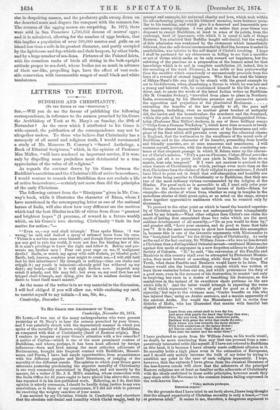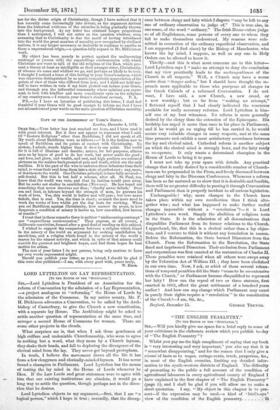MY Loun,—I was one of the many undergraduates who were
present Free, like yon rock, from base, vindictive pride, yesterday at St Mary's to hear the sermon preached by your Grace, Emblaze with gems the wrist that rends thy side ; and I was painfully struck with the depreciatoi& manner in which you With fruit neetarions or the balmy Hower; spoke of the morality of Eastern religions, and especially of Buddhism, All Nature calls aloud, ' Shall Man do less as compared with that of Christianity (itself of Eastern origin). May Than heal the stutter and the railer bless F" I venture to trespass on your Grace's attention with a few remarks? I have preferred to quote from Sir William Jones, as his -words would,. A native of Ceylon—which is one of the most prominent centres of no doubt, be more convincing than any that can proceed from a com- Buddhism, and where, perhaps, it has been least affected by foreign paratively interested critic like myself. If I have not referred to Buddhism influences—born and bred among the moat orthodox adherents of on this head, it is because I have already made sufficient allusion to it Brahmanism, brought into frequent contact with Buddhists, Mussul- Its morality holds a high place even in the estimation of Europeans, mans, and Parsis, I have had ample opportunities, from acquaintance and I should only unduly increase the bulk of my letter by trying to with the different peoples and their literatures, of judging of the establish my point in the case of each religion separately. I hope, morality of the different creeds. The opinion to which your Grace gave however, that the extracts I have given from the classical literature of utterance yesterday proclaiming the superior morality of Christianity the less-known creeds will show that the adherents of the principal is one -very commonly entertained in England, and not merely by the Eastern religions are at least as familiar as the adherents of Christianity masses, for a writer of Mr. J. S. Mill's standing, whose connection with with the ideals enshrined in these noble principles, however much they the India Office for 35 years ought to have placed him above this error, may share with the Westerns in the common human failing expressed in has repeated it in his last-published work. Believing, as I do, that this the well-known line,—
opinion is utterly erroneous, I should be hardly doing justice to my own "Video meliora proboque,
convictions, or to those of my countrymen, if I did not wish to prevent Detetiora sequor."
contempt, bred of immrance, with which it is usual to talk of things set to his followers, when, abandoning a throne to which he was heir and a young and beloved wife, he condemned himself to the life of a wan--
LETTERS TO THE EDITOR. derer, and, to quote the words of the latest Indian writer on Buddhism ____e___. (Sir M. Coomftra Swfimy), "travelled from place to place in Northern India, overcoming by his illustrious presence and persuasive speech BUDDHISM AND CHRLSTIANITY. the opposition and prejudices of the pharisaical Brahmans content myself, however, with the shortest of them, the concluding sen- tence of that eloquent passage in which M. Rdnan sums up the charac- other feature of Christianity on which, perhaps even more than on the-
two of the most ordinary virtues recommended by the religion of the
Hindus. For proof such as is accessible to all, I need only refer your
as the end of the last century, Sir William Jones—who was no less devout
aries, they must beware of asserting, while they teach the Gospel of fast by this inheritance I My strength is nothing—time can shake and Truth, what those Pandits and Maulavis would know to be false. The cripple it ; my youth is transient—already grief has withered up my former would cite the beautiful Aryan couplet which was written at days ; my beart,—alas l it is well nigh broken now. Anguish may
least three centuries before our era, and which pronounces the duty of crash it utterly, and life may fail ; but even so, my soul that has not
a good man, even in the moment of his destruction, to consist ' not only tripped shall triumph, and dying, give the lie to soulless destiny that
in forgiving, but even in a desire of benefiting his destroyer, as the
dares to boast itself man's master." sandal-tree in the instant of its overthrow sheds perfume on the axe- As the name of the writer is in no way material to the discussion, which fells it.' And the latter would triumph in repeating the verse- I will feel obliged if you will allow me, while enclosing my card, of Sadi which represents ' a return of good for good. as a slight re- has injured thee ' using an Arabic sentence, and a maxim apparently of Cambridge, December 7. P. A. the ancient Arabs. Nor would the Mussulmans fail to recite four distichs of Hafiz, who has illustrated that maxim with fanciful but Cambridge, November 30, 1874. Learn from you orient shell to love thy foe,
And store with pearls the band that brings thee woe; Mark where yon tree rewards the stony shower
I venture to trespass on your Grace's attention with a few remarks? I have preferred to quote from Sir William Jones, as his -words would,. A native of Ceylon—which is one of the most prominent centres of no doubt, be more convincing than any that can proceed from a com- Buddhism, and where, perhaps, it has been least affected by foreign paratively interested critic like myself. If I have not referred to Buddhism influences—born and bred among the moat orthodox adherents of on this head, it is because I have already made sufficient allusion to it Brahmanism, brought into frequent contact with Buddhists, Mussul- Its morality holds a high place even in the estimation of Europeans, mans, and Parsis, I have had ample opportunities, from acquaintance and I should only unduly increase the bulk of my letter by trying to with the different peoples and their literatures, of judging of the establish my point in the case of each religion separately. I hope, morality of the different creeds. The opinion to which your Grace gave however, that the extracts I have given from the classical literature of utterance yesterday proclaiming the superior morality of Christianity the less-known creeds will show that the adherents of the principal is one -very commonly entertained in England, and not merely by the Eastern religions are at least as familiar as the adherents of Christianity masses, for a writer of Mr. J. S. Mill's standing, whose connection with with the ideals enshrined in these noble principles, however much they the India Office for 35 years ought to have placed him above this error, may share with the Westerns in the common human failing expressed in has repeated it in his last-published work. Believing, as I do, that this the well-known line,— its receiving the -weighty sanction of your name. On the grounds that I have tried to set forth above,Ihave longthought I em assured by my Christian friends in Cambridge and elsewhere that the alleged superiority of Christian morality is only a boast,—"vox that the absolute self-denial and humility which Christ taught, both by et prteterea nihih" It seems to me, therefore, a dangerous argument to use for the divine origin of Christianity, though I have noticed that it has recently come increasingly into favour, as the argument derived from the historical evidence of the miracles is being gradually thrown into the background. As my letter has attained longer proportions than I anticipated, I will not enter on the question whether, even assuming that to Christianity is due the merit of having introduced into the world the great maxims of morality now recognised by civilised nations, it is any longer necessary or desirable to continue to ascribe to them a supernatural origin,—a question folly argued in Mr. Mill's latest -work.
My object has been merely to protest against the undiscerning 'contempt or (worse still) the supercilious condescension with which Christians are wont to talk of the old religions of the East, which pre- sent a theory at least as intelligible as their younger sister, Christianity, of whence we come and whither we go, and perhaps as likely to be true. I thought I noticed a trace of this feeling in your Grace's sermon, which was otherwise distinguished by so much sympathetic appreciation of the points of view of those who differed from you; and I ahaRnot hold my- self to have written in vain if my faint protest can induce your Grace, and through you the influential community whose opinions you repre- sent, to look with kindlier and more considerate eyes on the religions -of my countrymen.—I remain your Grace's obedient servant, P. A.
P.S.—As I have an intention of publishing this letter, I shall feel thankful if your Grace will be good enough to inform me that I have not misunderstood your words on the main question of Christian morality.



































 Previous page
Previous page